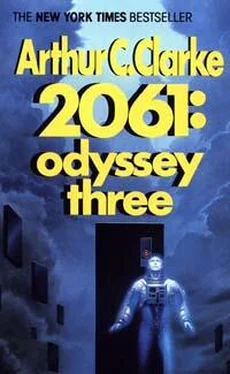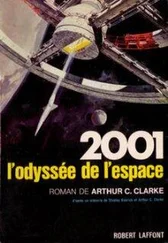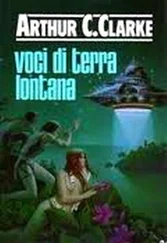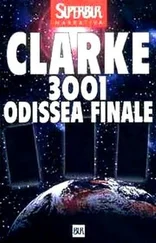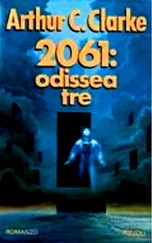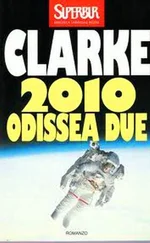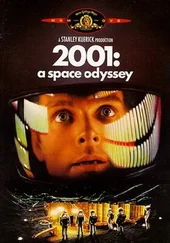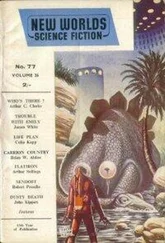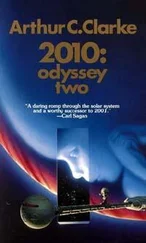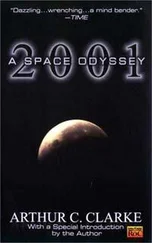Arthur Clarke - 2061 - Odyssey Three
Здесь есть возможность читать онлайн «Arthur Clarke - 2061 - Odyssey Three» весь текст электронной книги совершенно бесплатно (целиком полную версию без сокращений). В некоторых случаях можно слушать аудио, скачать через торрент в формате fb2 и присутствует краткое содержание. Жанр: Фантастика и фэнтези, на английском языке. Описание произведения, (предисловие) а так же отзывы посетителей доступны на портале библиотеки ЛибКат.
- Название:2061: Odyssey Three
- Автор:
- Жанр:
- Год:неизвестен
- ISBN:нет данных
- Рейтинг книги:3 / 5. Голосов: 1
-
Избранное:Добавить в избранное
- Отзывы:
-
Ваша оценка:
- 60
- 1
- 2
- 3
- 4
- 5
2061: Odyssey Three: краткое содержание, описание и аннотация
Предлагаем к чтению аннотацию, описание, краткое содержание или предисловие (зависит от того, что написал сам автор книги «2061: Odyssey Three»). Если вы не нашли необходимую информацию о книге — напишите в комментариях, мы постараемся отыскать её.
2061: Odyssey Three — читать онлайн бесплатно полную книгу (весь текст) целиком
Ниже представлен текст книги, разбитый по страницам. Система сохранения места последней прочитанной страницы, позволяет с удобством читать онлайн бесплатно книгу «2061: Odyssey Three», без необходимости каждый раз заново искать на чём Вы остановились. Поставьте закладку, и сможете в любой момент перейти на страницу, на которой закончили чтение.
Интервал:
Закладка:
Yva Merlin, on the other hand, fitted in perfectly, and was thoroughly enjoying herself. Despite her fame on Earth, few of the Medes had ever heard of her. She could wander around, in the public corridors and pressure domes of Ganymede Central, without people turning their heads or exchanging excited whispers of recognition. True, she was recognized – but only as another of the visitors from Earth.
Greenburg, with his usual quietly efficient modesty, had fitted into the administrative and technological structure of the satellite and was already on half a dozen advisory boards. His services were so well appreciated that he had been warned he might not be allowed to leave.
Heywood Floyd observed the activities of his shipmates with relaxed amusement, but took little part in them. His chief concern now was building bridges to Chris, and helping his grandson plan his future. Now that Universe – with less than a hundred tons of propellant left in its tanks – was safely down on Ganymede, there was much to be done.
The gratitude that all aboard Galaxy felt towards their rescuers had made it easy to merge the two crews; when repairs, overhaul and refuelling were complete, they would fly back to Earth together. Morale had already been given a great boost by the news that Sir Lawrence was drawing up the contract for a greatly improved Galaxy II – though construction was not likely to begin until his lawyers had settled their dispute with Lloyd's. The underwriters were still trying to claim that the novel crime of space hijacking was not covered by their policy.
As for that crime itself, no-one had been convicted, or even charged. Clearly, it had been planned, over a period of several years, by an efficient and well-funded organization. The United States of Southern Africa loudly protested innocence, and said it welcomed an official enquiry. Der Bund also expressed indignation, and of course blamed SHAKA.
Dr Kreuger was not surprised to find angry but anonymous messages in his mail, accusing him of being a traitor. They were usually in Afrikaans, but sometimes contained subtle mistakes in grammar or phraseology which made him suspect that they were part of a disinformation campaign.
After some thought, he passed them onto ASTROPOL – which probably already has them, he told himself wryly. ASTROPOL thanked him, but, as he expected, made no comments.
At various times, Second Officers Floyd and Chang and other members of Galaxy's crew were treated to the best dinners on Ganymede by the two mysterious out-wonders whom Floyd had already met. When the recipients of these (frankly disappointing) meals compared notes afterwards, they decided that their polite interrogators were trying to build up a case against SHAKA, but were not getting very far.
Dr van der Berg, who had started the whole thing – and had done very well out of it, professionally and financially – was now wondering what to do with his new opportunities. He had received many attractive offers from Earth universities and scientific organizations – but, ironically, it was impossible to take advantage of them. He had now lived too long at Ganymede's one-sixth of a gravity, and had passed the medical point of no return.
The Moon remained a possibility; so did Pasteur, as Heywood Floyd explained to him.
'We're trying to set up a space university there,' he said, 'so that off-worlders who can't tolerate one gee can still interact in real time with people on Earth. We'll have lecture halls, conference rooms, labs – some of them will only be computer-stored, but they'll look so real you'd never know. And you'll be able to go videoshopping on Earth, to make use of your ill-gotten gains.'
To his surprise, Floyd had not only rediscovered a grandson – he had adopted a nephew; he was now linked to van der Berg as well as Chris by a unique mix of shared experiences. Above all, there was the mystery of the apparition in the deserted Europan city, beneath the looming presence of the Monolith.
Chris had no doubts whatsoever. 'I saw you, and heard you, as clearly as I do now,' he told his grandfather. 'But your lips never moved – and the strange thing is that I didn't feel that was strange – it seemed perfectly natural. The whole experience had a – relaxed feeling about it. A little sad – no, wistful would be a better word. Or maybe resigned.'
'We couldn't help thinking of your encounter with Bowman, aboard Discovery,' added van der Berg.
'I tried to radio him before we landed on Europa. It seemed a naïve thing to do, but I couldn't imagine any alternative. I felt sure he was there, in some form or other.'
'And you never had any kind of acknowledgement?'
Floyd hesitated. The memory was fading fast, but he suddenly recalled that night when the mini-monolith had appeared in his cabin.
Nothing had happened, yet from that moment onwards he had felt that Chris was safe, and that they would meet again.
'No,' he said slowly. 'I never had any reply.' After all, it could only have been a dream.
VIII – THE KINGDOM OF SULPHUR
58 – Fire and Ice
Before the age of planetary exploration opened in the late twentieth century, few scientists would have believed that life could have flourished on a world so fan from the Sun. Yet for half a billion years, the hidden seas of Europa had been at least as prolific as those of Earth.
Before the ignition of Jupiter, a crust of ice had protected those oceans from the vacuum above. In most places the ice was kilometres thick, but there were lines of weakness where it had cracked open and torn apart. Then there had been a brief battle between two implacably hostile elements, which came into direct contact on no other world in the Solar System. The war between Sea and Space always ended in the same stalemate; the exposed water simultaneously boiled and froze, repairing the armour of ice.
The seas of Europa would have frozen completely solid long ago, without the influence of nearby Jupiter. Its gravity continually kneaded the core of this little world; the forces that convulsed Io were also working here, though with much less ferocity. The tug of war between planet and satellite caused continual submarine earthquakes, and avalanches which swept with amazing speed across the abyssal plains.
Scattered across those plains were countless oases, each extending for a few hundred metres around a cornucopia of mineral brines gushing from the interior. Depositing their chemicals in a tangled mass of pipes and chimneys, they sometimes created natural parodies of ruined castles or Gothic cathedrals, from which black, scalding liquids pulsed in a slow rhythm, as if driven by the beating of some mighty heart. And, like blood, they were the authentic sign of life itself.
The boiling fluids drove back the deadly cold leaking down from above, and formed islands of warmth on the seabed. Equally important, they brought from Europa's interior all the chemicals of life. Here, in an environment which would otherwise be totally hostile, were abundant energy and food. Such geothermal vents had been discovered in Earth's oceans, in the same decade that had given mankind its first glimpse of the Galilean satellites.
In the tropical zones close to the vents flourished myriads of delicate, spidery creatures that were the analogues of plants, though almost all were capable of movement. Crawling among these were bizarre slugs and worms, some feeding on the 'plants', others obtaining their food directly from the mineral-laden waters around them, At greater distances from the source of heat – the submarine fire around which all these creatures warmed themselves – were sturdier, more robust organisms, not unlike crabs or spiders.
Armies of biologists could have spent lifetimes studying a single small oasis. Unlike the Palaeozoic terrestrial seas, Europa's hidden ocean was not a stable environment, so evolution had progressed swiftly here, producing multitudes of fantastic forms. And they were all under indefinite stay of execution; sooner or later, each fountain of life would weaken and die, as the forces that powered it moved their focus elsewhere. The abyss was littered with the evidence of such tragedies – cemeteries holding skeletons and mineral-encrusted remains where entire chapters had been deleted from the book of life.
Читать дальшеИнтервал:
Закладка:
Похожие книги на «2061: Odyssey Three»
Представляем Вашему вниманию похожие книги на «2061: Odyssey Three» списком для выбора. Мы отобрали схожую по названию и смыслу литературу в надежде предоставить читателям больше вариантов отыскать новые, интересные, ещё непрочитанные произведения.
Обсуждение, отзывы о книге «2061: Odyssey Three» и просто собственные мнения читателей. Оставьте ваши комментарии, напишите, что Вы думаете о произведении, его смысле или главных героях. Укажите что конкретно понравилось, а что нет, и почему Вы так считаете.
